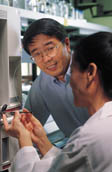 Targeting
the triggers Kung has been studying oncogenesis, the process by which cells become cancerous, since his postdoctoral work 20 years ago at the lab of eminent molecular biologists J. Michael Bishop and Harold Varmus, where oncogenes were first identified. Focused predominantly on prostate cancer, Kung's work seeks answers to some simple questions: Why do healthy prostate cells become cancerous? And what is the difference between healthy cells and those that grow, invade and spread to become cancer? "There is considerable evidence that oncogenes are the triggers for the aberrant growth, spread and invasion of cells," said Kung, who comes to UC Davis after 14 years at the Case Western Reserve University School of Medicine, where he held the Goodman-Blum Professorship in Cancer Research and was associate director of the cancer center. The particular oncogenes that have captured Kung's attention are enzymes known as tyrosine kinases. These 100 or so oncogenes produce proteins implicated in the growth and differentiation of cells. Many of these proteins sit on the surface of the cell, affected by what happens outside it and also empowered to direct what happens inside it. Photo right: For more than 20 years, cancer researcher Hsing-Jien Kung has been studying the process by which cells become cancerous and the differences between them and those that remain healthy.
Home |
Table of Contents |
To our Readers |
Building on Basics UC Davis Health System | © 2000, 2001, 2002 UC Regents. All rights reserved. |
  |
